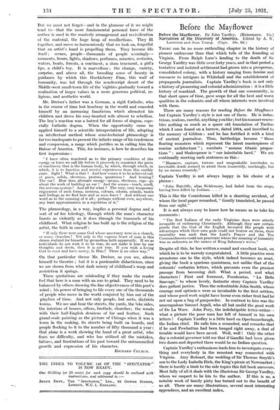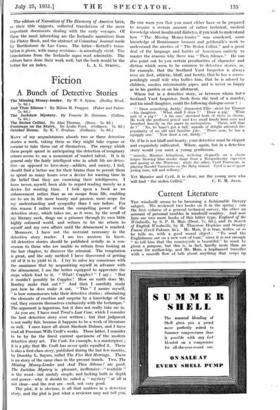Before the Mayflower
Before the Mayflower. By John Yardley. (Heinemann. Iris.) Narratives of the Discovery of America. Edited by A. W. Lawrence and Jean Young. (Cape. 10s. 6d.) THERE can be no more enthralling chapter in the history of pioneer endeavour than that which tells of the founding of Virginia. From Ralph Lane's landing to the death of. Sir George Yardley was little over forty years, and in that period a tentative and isolated settlement had grown into a prosperous, consolidated colony, with a history ranging from famine and massacre to intrigues in Whitehall and the establishment of propaganda journalists. Captain Yardley's book is not only a history of pioneering and colonial administration : it is a little history of mankind. The growth of that one community, in that short space of time, gave scope for all the best and worst qualities in the colonists and all whose interests were involved with them.
There are many reasons for reading Before the Mayflower but Captain Yardley's style is not one of them. He is indus- trious, zealous, careful, anything you like; but his manner resem- bles nothing so much as a queer old translation of Tacitus which I once found on a barrow, dated 1804, and inscribed to the memory of Gibbon : and he has fortified it with a kind of ancient journalese. Thus, battleships become " those floating monsters which represent the latest masterpieces of marine architecture! ; combats " assume titanic propor- tions " : and Shakespeare is " our inimitable bard." We are continually meeting such sentences as this :
" Massacre, capture, torture and unspeakable interludes to inevitable death seemed to await them insistently, mockingly, but by no means remotely."
Captain Yardley is not always happy in his choice of a
phrase : -
"John Ratcliffe, alias Sicklemore, had faded from the stage, having been killed by Indians. . . ."
This is like the Cornishman killed in a shunting accident, of whom the local paper remarked, " Gently translated, he passed from our sight."
It is not always easy to know how he means us to take his comments " The Red Indians of the early Virginian days were utterly incapable of embracing Christianity. Although they saw certain proofs that the God of the English favoured His people with advantages which their own gods could not bestow on them, their mentality was such that the Lord's Prayer and the Ten Commandments could not penetrate where the meaning of humanity was as unknown as the names of King Solomon's wives."
Despite all this, he has written a sound and excellent book, on which he is to be warmly congratulated. A little practice soon accustoms one to the style, which indeed becomes an asset, giving the book a spurious quaintness, not unlike that of the colonists' verbatim letters, which prevents even the prosiest passage from becoming dull. What a period, and what characters ! First and foremost, Pocahontas, " La Belle. Sauvage," to whose lovely, fantastic story Captain Yardley does gallant justice. Then the redoubtable John Smith, whose courage and optimise were so invaluable to the first settlers, and whose good work might have borne even richer fruit had he not sat upon a bag of gunpowder. In contrast to him was the unscrupulous Samuel Argall, who all but undid the good work of De La Warr. John Pory, the indefatigable letter-writer- what a picture the poor man has left of himself in his own letters ! Captain Yardley is a little hard on ,Opechanachaugh, the Indian chief. He calls him a scoundrel, and remarks that if he and Powhattan had been hanged right away, a deal of trouble would have been saved. Well, well ! Only the other day a colonial governor told me that if Gandhi had been given two dozen and deported there would be no Indian question.
Captain Yardley's enthusiasm leads him to investigate every- thing and everybody in the remotest way connected with Virginia. Amy Robsart, the wedding of Sir Thomas Smyth's son to the Lady Isabella Rich, the King's picnic at Newmarket ; there is hardly a limit to the side topics this full book uncovers. Most fully of all it deals with the illustrious Sir George Yardley, whom we suspect to be kin to the author. If this is so, a notable work of family piety has turned out to the benefit of us all. There are many illustrations, several most interesting appendices, and an excellent index.
The editors of Narratives of. The Discovery of America have, as their title suggests, collected translations of the more important documents dealing with the early voyages. Of these the most interesting are the Icelandic narratives from the Flatey Book, and the abstract of Columbus' Journal made by Bartholome de Las Casas. The latter—Kettell's trans- lation is given, with many revisions—is amazingly vivid. The translations from the Icelandic sagas read admirably. The editors have done their work well, but the book would be the











































 Previous page
Previous page